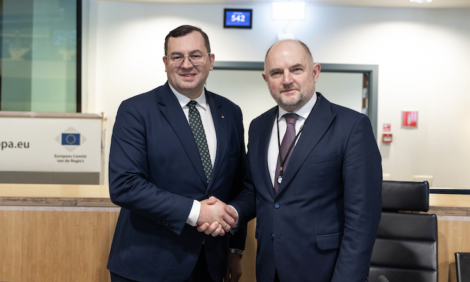



Pork Act Delegates Elect National Pork Board Members and Vote on Pork Checkoff Resolutions at Annual Meeting
US - Pork Act Delegates conducted elections for new members of both the National Pork Board and the Pork Board Nominating Committee and dealt with industry-related resolutions during their annual business meeting, March 2-4 in Kansas City, Mo., during the National Pork Industry Forum.
“The good sense of the Delegates always comes through,“ said Danita Rodibaugh, a pork producer from Rennselaer, Ind., and president of the National Pork Checkoff Board. “This is a great opportunity for us to sit together from all different states, all different opinions and hash out the issues that are going to affect our operations and the things that are near and dear to our heart and our industry, whether it be national, worldwide or at home in our backyard.“
Each year, Pork Act Delegates have the opportunity collectively to make decisions about the Pork Checkoff, including recommending the rate of the Checkoff, the percentage of Checkoff that is returned to states, and nominating producers and/or importers for appointment to the National Pork Board and to the Checkoff Nominating Committee. The recommendations for appointments to the National Pork Board are made to the U.S. secretary of agriculture, who makes the final determination.
In voting on National Pork Board members, nine pork producers were ranked for consideration by the secretary of agriculture. The secretary will appoint six: five to serve three-year terms and one to finish the remaining two-year term of Deb Johnson, who resigned to become the North Carolina state executive. The secretary’s appointments typically are announced during the summer. The nominees, as ranked by the Delegates, are:
- Dianne Bettin, Minnesota
- Dennis Michael, South Dakota
- Jeff Galle, Illinois
- Gene Nemechek, North Carolina
- Randy Brown, Ohio
- Alan Wilhoite, Indiana
- Dale Springer, Kansas
- Curtis Meier, Iowa
- David Reinecker, Pennsylvania
- Brad Greenway, South Dakota
- Brent Sandidge, Missouri
Pork Act Delegates also adopted resolutions asking the National Pork Board to:
Work with producers and all decision-makers to place a strong focus on improving the image of pork producers by educating the public about modern pork operations, by stressing the economical viability of these farms, by emphasizing the involvement of family members, and by recognizing producers commitment to the betterment of the community and the environment.
Examine/revise current committee structure to ensure adequate producer leadership focus on image enhancement.
Develop educational materials to support producers on registering their premises with their State Animal Health Officials as well as make preparations to help producers implement enhancements to their current reporting and recording systems to protect them against highly contagious disease outbreaks.
Research the implementation of a swine species-specific identification system that would meet the U.S. Department of Agriculture (USDA) goal of a 48-hour traceback in the event of a highly contagious disease outbreak and not cause pork producers to bear additional costs over what is borne today.
The National Pork Board announced that an agreement had been reached with the National Pork Producers Council for the purchase of Pork. The Other White Meat ™, so that this brand, which is the foundation for most Checkoff promotion, would be owned and controlled by America’s 70,000 pork producers. The delegate body took no action to change the return to states and the assessment rate.
Pork Act Delegates are pork producers or importers nominated by their state pork producer associations or individually, then appointed by the secretary of agriculture. Each of the 50 states may be represented by at least two Pork Act Delegates. The number of delegates and the voting “power“ of each delegate are determined by the amount of Checkoff collected from the state they represent.
For 2006, the U.S. Department of Agriculture appointed 153 pork producers and eight importers to the National Pork Producers Delegate Body. Three states did not submit nominees and four states submitted only one nominee. Importer representation is based on assessments on imported pork and pork products.
ThePigSite News Desk






